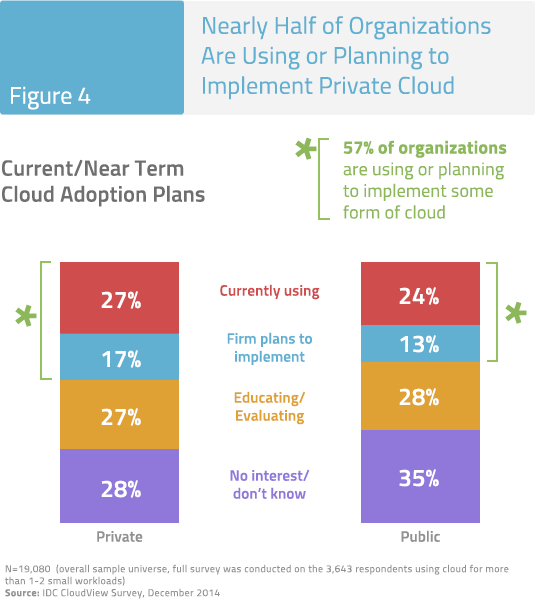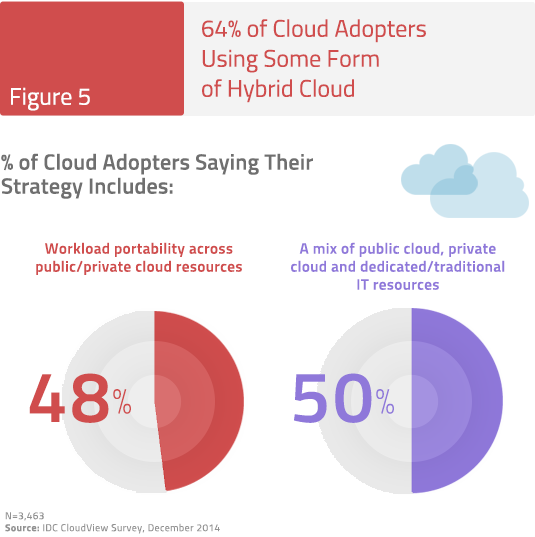Importance of Private and Hybrid Cloud
Adoption of Private Cloud Is Correlated to Better Expected Business Outcomes

One hallmark of the second wave of cloud is the degree of private cloud adoption.
Private cloud enables an IT organization to act like a large-scale public cloud supplier – with better resource use, greater scale, faster time to respond to requests – but with the added control and security of resources dedicated to the use of a single company. As Figure 4 shows, 44% of all organizations are either currently using or have firm plans to implement private cloud, an even greater number than the 37% that are using or have firm plans to implement public cloud.
Private cloud adopters are realizing significant business benefits. 55% of current private cloud users expect their cloud infrastructure to better enable them to allocate IT budgets to more strategic purposes, compared to 50% of those who are not using private cloud. Similarly, 54% of those using private cloud expect their cloud infrastructure to increase revenue compared to 47% of those who are not using private cloud.

Hybrid Cloud Requires Workload Portability, Security, and Policy Enablement
Hybrid cloud is also growing, but this study showed that organizations are using many different definitions of hybrid cloud. The two common threads among these definitions are workload portability and combining the use of public and dedicated cloud.
Fully 48% of companies with active cloud deployments are practicing some sort of workload portability and 50% of cloud users are combining public and dedicated/private IT resources. Overall, companies that are adopting at least one of these two hybrid cloud approaches constitute 64% of cloud adopters (Figure 5).

Adopting hybrid cloud is more complex than adopting other forms of cloud. It requires workload portability, security, and policy enablement. Most survey respondents expect to migrate data between public and private clouds, and have high security and policy requirements. In addition, most respondents (64%) expect their IT organizations to act as IT service brokers and need solutions that support a single view of the IT and business services irrespective of how they have been provisioned, and to support governed, policy-based access to these services wherever they may be.

Open Source and OpenStack Are Driving Significant Business Benefits
OpenStack is a key driver behind private/hybrid cloud.
65% of survey respondents say OpenStack is important to their cloud strategy, whether via open source and/or commercial distributions. OpenStack is emerging as a private cloud orchestration platform, with customers drawn to it to reduce both vendor lock-in as well as long-term operational costs, and to commercial OpenStack plug-in architectures to better enable OpenStack-based enterprise solutions.
The study showed that those adopting private cloud and open source OpenStack technology are realizing even greater benefits than cloud adopters as a whole. Firms for which OpenStack is an important part of their strategy tended to have greater expectations to how their cloud deployments will improve their ability to optimize their IT budget allocation, improve revenue, and increase their SLAs. For example, 17% more respondents for whom OpenStack is important felt their cloud deployments would improve revenue than those for whom OpenStack is a less important part of their mix.
